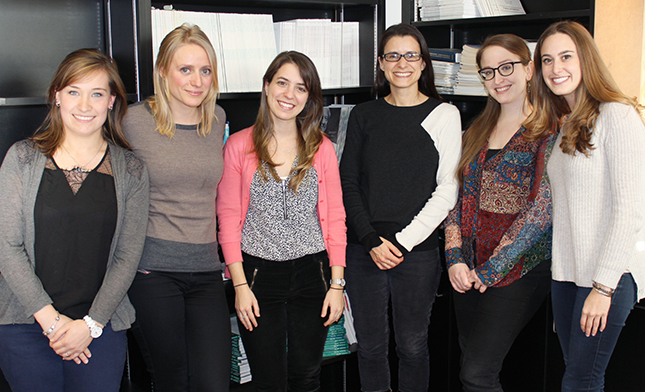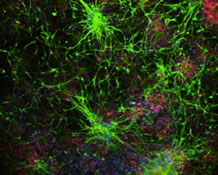Columbia University
Irving Medical Center
Neurological Institute
710 West 168th Street, 3rd floor
(212) 305-1818
Featured Research
In the Lab:
Stephanie Cosentino, PhD
 Stephanie Cosentino, PhD
Stephanie Cosentino, PhDDr. Cosentino is a clinical and experimental neuropsychologist whose work entails characterizing heterogeneity in the cognitive profiles of Alzheimer's disease (AD) and other neurodegenerative conditions, including frontotemporal dementia (FTD) and essential tremor (ET). Within this broad focus, Dr. Cosentino has established a novel line of research that investigates heterogeneity in individual's subjective experience of cognitive symptoms, and the relevance of disordered subjective cognition (i.e., disordered self-awareness). Specifically, Dr. Cosentino has two main areas of interest:
1. Cognitive Profiles of Neurodegenerative Disease: Cognitive assessment is a critical component of dementia evaluations, informing the early regional distribution of neuropathology and, therefore, playing an important part in the differential diagnosis of dementia syndromes. Heterogeneous cognitive presentations of disease challenge accurate diagnosis and also have implications for disease outcomes. Dr. Cosentino's work has examined the factors that predict cognitive heterogeneity, as well as the extent to which specific cognitive presentations hold prognostic value for disease outcomes. As part of her research, she has worked with large scale, longitudinal data sets to show, for example, that the APOE e4 allele not only increases risk for AD but contributes to faster rates of cognitive change following diagnosis. She has also shown that specific cognitive presentations of AD, such as early and differential impairment in verbal fluency or social cognition, hold prognostic value for important disease outcomes such as mortality and dependence. Dr. Cosentino's work also strives to elucidate cognitive heterogeneity in other neurologic diseases, such as FTD and ET. She currently has NIH funding to examine the earliest cognitive changes in these diseases, and to examine the etiology and relevance of specific patterns of cognitive impairment. The ultimate goal of these projects, which aim to provide novel insight into the early cognitive signatures of neurologic disease, is to improve diagnostic and prognostic accuracy for these conditions, and to inform treatment efficacy.
2. Subjective Cognitive Aging (Self-Awareness): Heterogeneity in the cognitive profiles of neurodegenerative diseases is mirrored by striking heterogeneity in individuals' subjective experience of cognitive changes. The subjective perception of cognitive change is a critical determinant of important decisions, such as whether to seek medical evaluation, take a treatment for memory loss, or stop driving. Yet little is known about the etiology, nature, and broader implications of disordered subjective cognition (i.e., disordered awareness). Dr. Cosentino has sought to advance the study of awareness, particularly in the context of AD, by merging methodological approaches and theoretical concepts from the fields of neuropsychology and cognitive psychology. Work from her Paul B. Beeson Career Development Award in Aging provided novel evidence that self-awareness is a unique, identifiable construct that can selectively deteriorate in the context of disease, and that this metacognitive construct is, in part, supported by a critical right hemisphere network involving insular cortex, and linking temporal and prefrontal regions. The ultimate goal of this line of work is to determine the precise mechanisms by which self-awareness breaks down in AD and other diseases, so that clinicians and family members may have the greatest success in managing disordered awareness. Dr. Cosentino is also interested in understanding the everyday implications of disordered awareness. She has shown that individuals with AD who are unaware of their memory loss make suboptimal decisions about how to manage their medications. She is currently examining the manner in which awareness influences a wide range of everyday decisions, with the ultimate goal of determining how decision making can be enhanced in cognitively impaired older adults to preserve independence and autonomy for as long as possible.
Finally, and most recently, Dr. Cosentino has expanded her work in subjective cognition to examine the nature and relevance of subjective cognitive decline (SCD) in ostensibly healthy older adults. SCD, or the perception that one's cognition is declining despite normal performance on cognitive testing, is rapidly gaining attention as a potential marker of pre-clinical AD. However, there are a range of factors that can influence SCD, and it is critical to understand these factors before SCD can be used as a reliable marker of pre-clinical disease. Dr. Cosentino is interested in understanding how person-specific factors and measurement issues influence older adults' reports of their cognitive abilities. For example, work from her lab recently showed that older adults provide the most accurate assessment of their memory when asked to evaluate themselves in relation to others their age, rather than to assess their memory in general. As part of this line of work, Dr. Cosentino is currently collaborating with colleagues at the NYPSI Stroud Centre to examine the extent to which specific cognitive complaints are more closely associated with primarily cognitive versus affective disturbances. She is also embarking on a study in collaboration with researchers at the Columbia Aging Center that will assess how person specific factors (i.e., metacognition, attitudes toward aging, personality) influence the subjective perception of cognition in older adults.
 From left to right, Elodie Bertrand, Silvia Chapman, Martina Azar, Stephanie Cosentino, Brittany DeFeis, and Leigh Colvin. Not pictured, Preeti Sunderaraman.
|
Members of Dr. Cosentino's Research Team Include:
Martina Azar, BS is a research assistant in the Taub Institute working on both clinic-based and community-based projects examining the predictors and the factors that influence disease outcomes in AD. She recently led a project examining whether ethnicity influences caregiver perception and report of dementia symptoms, and is now conducting a study to determine the extent to which patients with essential tremor are aware of specific cognitive deficits.
Elodie Bertrand, MS is a doctoral candidate at the PUC-Rio (Brazil) and a visiting scholar at the Taub Institute. She is interested in exploring awareness and metacognition in cognitive aging and neurodegenerative diseases, specifically in AD. She uses experimental designs to investigate the impact of mood and third-person perspective on awareness in AD patients. She also works with neuroimaging techniques to explore the neuroanatomic correlates of metacognition in cognitively diverse older adults.
Silvia Chapman, MS is a doctoral candidate at Goldsmiths College, University of London and a visiting scholar at the Taub Institute. Silvia is interested in understanding the cognitive, psychological, and neuroanatomical factors that contribute to disordered awareness of memory impairment in individuals who have suffered a stroke.
Leigh Colvin, BA is a doctoral candidate in the Clinical Psychology program at Teachers College, Columbia University. Leigh is interested in the relationship between metacognition and personality among cognitively normal older adults.
Brittany DeFeis, BA is a research coordinator at the Taub Institute working on multiple cognitive aging studies investigating which features of cognition change with age in the absence of Alzheimer's disease, as well as investigating individual differences in susceptibility to aging and Alzheimer's disease. She is currently leading two projects in Dr. Cosentino's lab that examine how unawareness of cognitive impairment in AD, and lack of disclosure of the AD diagnosis, influence patient healthcare utilization.
Preeti Sunderaraman, PhD is a neuropsychology postdoctoral fellow in the Taub Institute. Given her diverse, cross-cultural training in the US and in India, Preeti is interested in conducting research that will inform clinical practice and help to develop empirically grounded treatment guidelines across geographical boundaries. She envisions her research to focus primarily on refining the construct of social and economic decision making, and within this, to understand how awareness of decision making abilities influences important outcomes in older adults and various clinical populations. Currently, she has projects underway to understand the association between subjective cognition and risky decision making, to explore the contribution of specific genes to cognitive aging and decline, and to study the influence of culture on aging in countries such as India and South Africa.

